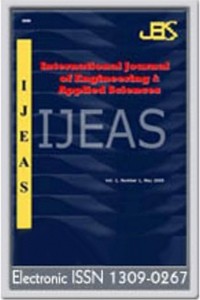Artificial Neural Networks Driven Data-Based Optimization Analysis to Locate Crisis Reaction Offices for Marine Transportation in Antalya
A mishap might happen at any port along Antalya’s 500-kilometer shorelines, and the counter spillage group ought to be on schedule for an intercession. The aim of this study is to decide the most appropriate areas for the counter spillage group office for Antalya’s tourist ports. For this reason, Tree Seeds Algorithm (TSA), Symbiotic Organisms Search (SOS), Sooty Terns Optimization Algorithm (STOA), and Weiszfeld Algorithm (WA) optimization methods are used to track down the most advantageous area. The first three procedures are almost new and forward-thinking methods. Notwithstanding, the last one is a notable calculation for taking care of organization-based enhancement issues. This research aims to accomplish an ideal area and evaluate the exhibitions of TSA, SOS, STOA, and WA. Hence, this article offers a crisis reaction office area for oil leakage safety brought about by marine mishaps in Antalya Gulf. The originality and the main contribution of the paper to the literature is as follows: 1) for the first time, the presentations of the four optimization algorithms are analyzed and inspected together, 2) the most appropriate locations for the counter spillage group office for Antalya’s ports are determined for first time in the literature.
___
- Atherton, T., Wilks, J., Health and safety in Australian marine tourism: A social, medical and legal appraisal. Journal of Tourism Studies, 5(2), 2-16, 1994.
- Bentley, T., Page, S., Meyer, D., Chalmers, D., Laird, I., How safe is adventure tourism in New Zealand? An exploratory analysis. Applied ergonomics, 32(4), 327-338, 2001.
- Yang, E.C.L., Sharif, S.P., Khoo-Lattimore, C., Tourists' risk perception of risky destinations: The case of Sabah's eastern coast. Tourism and Hospitality Research, 15(3), 206-221, 2015.
- Carpenter, S.R., Stanley, E.H., Vander Zanden, M.J., State of the world's freshwater ecosystems: physical, chemical, and biological changes. Annual review of Environment and Resources, 36, 75-99, 2011.
- Barbier, E.B., Burgess, J.C., Folke, C., Paradise Lost?: the ecological economics of biodiversity (Vol. 2), Routledge, 2019.
- Ficke, A.D., Myrick, C.A., Hansen, L.J., Potential impacts of global climate change on freshwater fisheries. Reviews in Fish Biology and Fisheries, 17(4), 581-613, 2007.
- Lafferty, K.D., Harvell, C.D., Conrad, J.M., Friedman, C.S., Kent, M.L., Kuris, A.M., ... Saksida, S.M., Infectious diseases affect marine fisheries and aquaculture economics. Annual review of marine science, 7, 471-496, 2015.
- Akis, A., The effects of mass tourism: A case study from Manavgat (Antalya–Turkey). Procedia-Social and Behavioral Sciences, 19, 289-296, 2011.
- Ozdemir, B., Aksu, A., Ehtiyar, R., Çizel, B., Çizel, R.B., İçigen, E.T., Relationships among tourist profile, satisfaction and destination loyalty: Examining empirical evidences in Antalya region of Turkey. Journal of Hospitality Marketing & Management, 21(5), 506-540, 2012.
- de Meo, I., Miglietta, C., Mutlu, E., Deval, M.C., Balaban, C., Olguner, M.T., Ecological distribution of demersal fish species in space and time on the shelf of Antalya Gulf, Turkey. Marine Biodiversity, 48(4), 2105-2118, 2018.
- Gul, M., Ak, M.F., A comparative outline for quantifying risk ratings in occupational health and safety risk assessment. Journal of Cleaner Production, 196, 653-664, 2018.
- Kiran, M.S., TSA: Tree-seed algorithm for continuous optimization. Expert Systems with Applications, 42(19), 6686-6698, 2015.
- Cheng, M.Y., Prayogo, D., Symbiotic organisms search: a new metaheuristic optimization algorithm. Computers & Structures, 139, 98-112, 2014.
- Dhiman, G., Kaur, A., STOA: a bio-inspired based optimization algorithm for industrial engineering problems. Engineering Applications of Artificial Intelligence, 82, 148-174, 2019.
- Weiszfeld, E., Sur le point pour lequel la somme des distances de n points donnés est minimum. Tohoku Mathematical Journal, First Series, 43, 355-386, 1937.
- Aydoğdu, İ., Comparison of metaheuristics on multi objective (cost&C0 2) optimization of RC cantilever retaining walls. Pamukkale University Journal of Engineering Sciences, 23, 2017.
- Demir, E., Havalimanlarında kalkış öncesi, acil durumlarda, yardım alınabilecek en uygun lokasyonun Weber problemine uyarlanarak belirlenmesi. Türk Coğrafya Dergisi, 70, 81-85, 2018.
- Demir, E., Kockal, N.U., Iterative methodology on locating a cement plant. Journal of Inequalities and Applications, 2019, 1-8, 2019.
- Uzun, B., Civalek, O., Aydogdu, I., Optimum design of nano-scaled beam using the social spider optimization (SSO) algorithm. Journal of Applied and Computational Mechanics, 2019.
- Demir, E., Aydoğdu, İ., Transportation Path Assignment Within the Airports in Turkey. In International Conference on Harmony Search Algorithm, Springer, Singapore, pp 207-217, 2020
- Demir, E., Trafik Verilerine Göre Afetlerde Bölgesel Hizmet Verebilecek İdeal Havalimanı Önerileri. Doğal Afetler ve Çevre Dergisi, 7, 101-109, 2021.
- Wessel, P. and Smith, W. H., A global, self‐consistent, hierarchical, high‐resolution shoreline database. Journal of Geophysical Research: Solid Earth, 101(B4), 8741-8743, 1996.
- Moré, J.J., The Levenberg-Marquardt algorithm: implementation and theory. In Numerical analysis (pp. 105-116). Springer, Berlin, 1978.
- Ranganathan, A., The levenberg-marquardt algorithm. Tutoral on LM algorithm, 11(1), 101-110, 2004.
- Marquardt, D., An Algorithm for Least-Squares Estimation of Nonlinear Parameters, SIAM Journal on Applied Mathematics, 2, 431-441, 1963.
- Hagan, M.T., Menhaj, M.B., Training feedforward networks with the Marquardt algorithm. IEEE transactions on Neural Networks, 5(6), 989-993, 1994.
- Hagan, M.T., Demuth, H.B., Beale, M.H., Neural Network Design, PWS Publishing, 1996.
- King, T., Soltys, M., Minimum Path Star Topology Algorithms for Weighted Regions and Obstacles. arXiv preprint arXiv:2109.06944, 2021.
- Başlangıç: 2009
- Yayıncı: Akdeniz Üniversitesi
